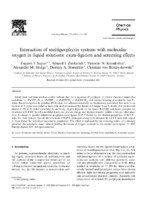| dc.contributor.author | Sagun, E. I. | en |
| dc.contributor.author | Zenkevich, E. I. | en |
| dc.contributor.author | Knyukshto, V. N. | en |
| dc.contributor.author | Shulga, A. M. | en |
| dc.contributor.author | Starukhin, D. A. | en |
| dc.contributor.author | Borczyskowski, C. von | en |
| dc.date.accessioned | 2017-05-26T12:07:27Z | |
| dc.date.available | 2017-05-26T12:07:27Z | |
| dc.date.issued | 2002 | |
| dc.identifier.citation | Interaction of multiporphyrin systems with molecular oxygen in liquid solutions: extra-ligation and screening effects / E. I. Sagun [et al.] // Chemical Physics. – 2002. – Vol. 275, № 1-3. – P. 211-237. | en |
| dc.identifier.uri | https://rep.bntu.by/handle/data/30170 | |
| dc.description.abstract | Steady-state and time-resolved studies indicate that for a sequence of porphyrin or chlorin chemical dimers Zn-cyclodimer → (ZnOEP)₂Ph → (ZnOEP)₂ → (ZnHTPP)₂ → (ZnOEChl)₂ with relative lowering of excited S₁- and T₁-states, the extra-ligation by pyridine (PYR) does not influence essentially on fluorescence parameters but leads to an increase of T₁-states non-radiative decay (the most pronounced for dimers with higher lying T₁-levels). For pyridinated dimers at 293 K T₁-states quenching by molecular oxygen depends on the spacer flexibility and donor-acceptor interactions with PYR. In self-assembled triads and pentads energy and electron transfer (within a few ps) takes place from Zn-dimers to pyridyl substituted porphyrin extra-ligand, H₂P, followed by the effective population of H₂P T₁-state. For these systems, bimolecular constants of H₂P T₁-states quenching by O₂ decrease by 1.4-1.8 times with respect to those found for individual monomeric porphyrins. This effect is explained by the screening action of a strongly quenched Zn-porphyrin dimer subunit limiting the access of oxygen molecule to the excited extra-ligand. © 2002 Elsevier Science B.V. All rights reserved. | en |
| dc.language.iso | en_US | e |
| dc.title | Interaction of multiporphyrin systems with molecular oxygen in liquid solutions: Extra-ligation and screening effects | en |
| dc.type | Article | ru |
| dc.identifier.doi | 10.1016/s0301-0104(01)00517-1 | |

